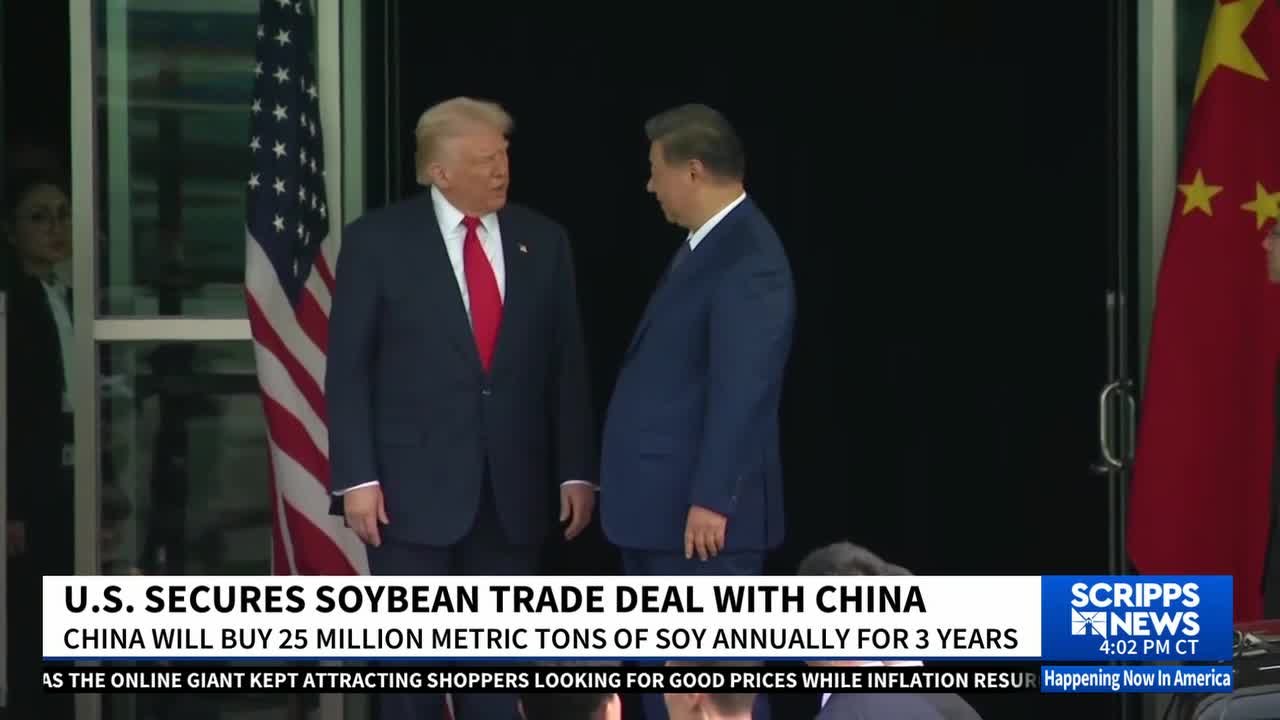U.S. President Donald Trump announced new trade measures with China, including scaled-back tariffs, following a meeting with Chinese President Xi Jinping on Thursday.
The announcement came amid trade tensions between the countries after China sought more sweeping rare earth material export controls, and President Trump threatened an additional 100% tariff against Chinese goods in response.
"I guess on the scale from zero to 10, with 10 being the best, I would say the meeting was at 12," President Trump told reporters.
He announced the U.S. will halve fentanyl-related tariffs from 20% to 10% against China while other investigation-related tariffs remain, as it committed to help stem the flow of fentanyl into the U.S., bringing tariffs generally to 45%-47%.
"He's going to work very hard on it. Precursors. And I think you're going to see some real action taken," Trump said of his Chinese counterpart.
IN CASE YOU MISSED IT | Ontario to pull ad criticizing US tariffs after weekend World Series games
"China and the United States are the two largest economies in the world, and it is critical that we make sure that we don't get into conflict with each other," former Deputy Secretary of State Wendy Sherman said in an interview with CNN.
Meanwhile, China will suspend restrictions on exports of rare earth minerals. The measure, when announced by the Chinese previously, had initially prompted a strong rebuke from the Trump administration and a threat of an additional 100% tariff on Chinese goods.
"The Chinese saw that. The whole world reacted to this, they overstepped, and so they, they've now said we're not going to do that. We have some rare earth controls from earlier in the year on magnets, where we got to a decent flow, but now we expect them to flow even, even better. We expect there to be more of a Chinese general approach to permissiveness and allowing that rare earth magnet flow. So even that improved," United States Trade Representative Amb. Jamison Greer told Scripps News Group.
It comes as the U.S. has sought deals with allies on critical minerals, including efforts to increase mining and processing.
"As the leader of a U.S. company manufacturing permanent magnets, we keep hearing that customers want magnets from outside China. The U.S. must go all-in during this one-year period to let supply chains mature outside of China, which can create a transparent, predictable, and reliable global marketplace," said Wade Senti, president of Advanced Magnet Lab.
President Trump said the leaders also discussed chips, with China expected to speak with Nvidia. Greer said they expect Chinese investigations of U.S. chipmakers "to go away."
Additionally, the U.S. will also suspend measures related to investigations against China's maritime and shipbuilding.
IN RELATED NEWS | What happens to revenue brought in by Trump's tariffs?
China also agreed to agricultural purchases. China will purchase 12 million metric tons of soybeans by January and at least 25 million metric tons annually through 2028, according to a White House official. The amount is a "floor" according to USDA Sec. Brooke Rollins, who also noted commitments to buy sorghum, hardwood and the removal of "unwarranted retaliatory tariffs" on agricultural products.
That will be welcome news for farmers like Chris Cherry who spoke to Scripps News Group earlier in the week.
"We need to have a deal done for us to be where we're profitable," Cherry said.
While calling the announcement a positive development, the American Soybean Association also noted "China has historically purchased 25 to 30 million metric tons of U.S. soybeans in recent years, and today's commitments lay a strong foundation to return to those traditional volumes over the coming marketing years."
Reduced tariffs could bring the prices down on some goods imported from China, but University of Tampa economics professor Abby Hall says consumers will still feel the pinch from previous tariffs.
"While this is a reduction in the tariff rate that's being imposed on China, it's certainly by no means an elimination," Hall said.
"So will consumers ultimately notice a big difference at the end of the day? Maybe on some goods, but this is certainly not going to eliminate the economic pain that consumers will feel as a result of the tariffs," Hall added.





